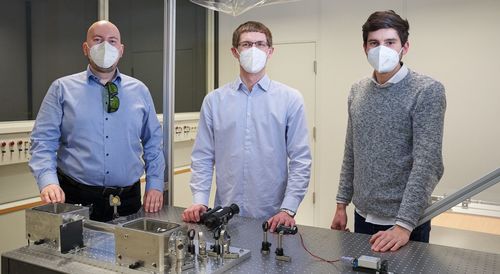The three-member founding team of n2-Photonics is developing technology for ultra-short pulse lasers at Helmut Schmidt University (HSU) and is being supported by beyourpilot. The Federal Ministry for Economic Affairs and Energy is now funding the start-up with 800,000 euros within the EXIST research transfer programme.
To meet the growing demand for stable and reliable ultrashort pulse lasers, the n2-Photonics team has set itself the goal of bringing an innovative pulse shortening process to market. “Ultra-short pulse lasers are used, for example, in modern microscopy processes, in the observation of fast chemical reactions where temporal information is to be evaluated, or in the material processing of ever smaller structures for medical technology or for quantum computers,” explains Christian Franke. He is the commercial head and runs the application-related development of the optomechanical components. Co-founders Kilian Fritsch and Dr Jürgen Raab are responsible for the technical-physical development as well as the optimisation of the core technology.
”Pulse shortening in itself is now a well-known technology. Our innovation is to make it easy and reliable to use,” explains Jürgen Raab. This means that scientists from other disciplines can also use the technology to record super slow-motion images of microscopic systems, for example. In materials processing, the increase in peak power through pulse shortening can be used for new types of manufacturing processes. The technology, developed in five years of research, is unique worldwide and a novelty on the market. It is characterised by previously unattained process stability and longevity in the pulse durations and peak powers achieved.
“Thanks to HSU’s excellent research infrastructure, including its own design department and a modern mechanical workshop, the team can significantly accelerate prototype development. The knowledge and technology transfer institutions Max Planck Innovation and Hamburg Innovation were already on hand to advise the team during the application phase,” explains Univ. Prof. Dr. Oleg Pronin, holder of the Chair of Laser Technology and Spectroscopy. Pronin is one of the leading scientists in the field of ultrashort pulse lasers and supports the team in the project implementation with his scientific and technical expertise.
Dr Andrea Otto from beyourpilot supervises the n2-Photonics team. Among other things, she helped develop the business plan and closely accompanied the successful EXIST application process, which convinced the jury of the Federal Ministry for Economic Affairs and Energy. The EXIST programme is aimed at outstanding, research-based start-up projects that involve complex technological development work. The amount of funding during the two-year project phase for n2-Photonics is over 800,000 euros. The implementation of the third-party funded project takes place at the Chair of Laser Technology and Spectroscopy.
Links:

